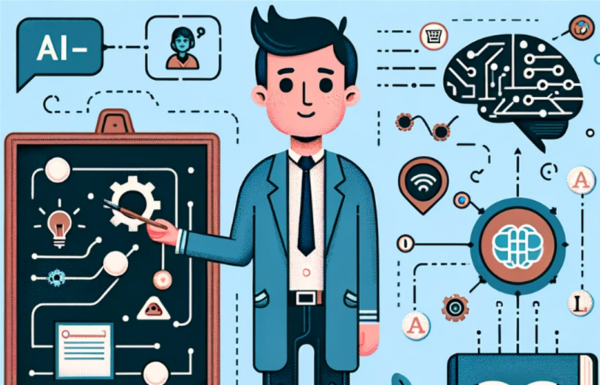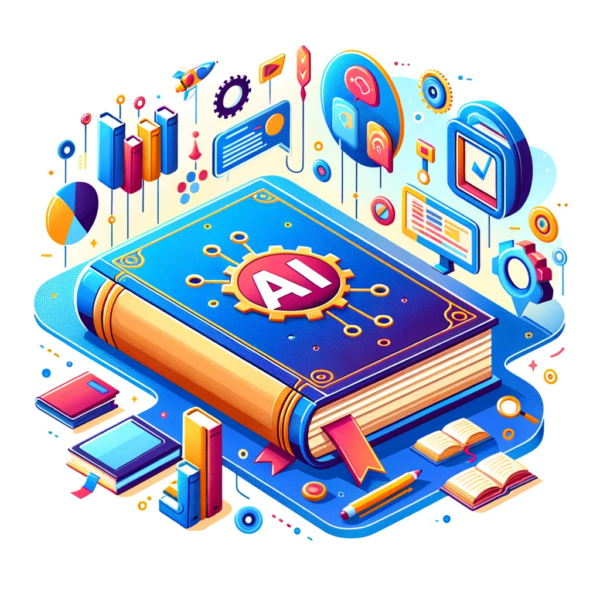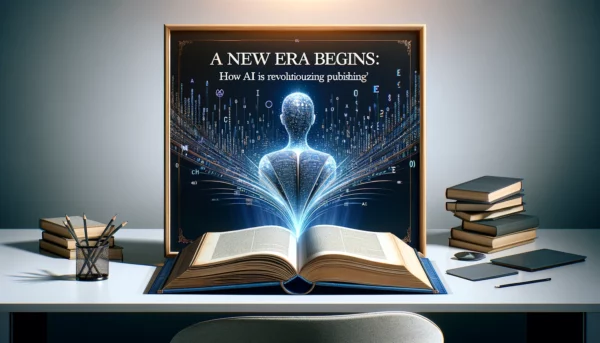In the rapidly evolving digital landscape, strategies for content creation utilizing AI technology have emerged as a pivotal force reshaping how businesses engage with their audience.
These strategies leverage artificial intelligence to enhance and streamline the process of creating, managing, and optimizing content, tailored to meet the dynamic demands of today’s digital consumers.
The importance of a robust content strategy in the digital age cannot be overstated. It’s no longer just about producing content; it’s about crafting relevant, engaging, and personalized experiences that resonate with the target audience, ultimately driving business success.
AI-driven Content strategies harness a blend of natural language processing, machine learning, and data analytics to offer unprecedented efficiency and insights.
From automating mundane tasks like keyword research and data analysis to generating high-quality, relevant content, AI tools are transforming the content creation landscape.
This innovation enables content creators to focus more on creative and strategic aspects, leaving the repetitive and analytical tasks to AI.
Moreover, AI’s ability to analyze vast amounts of data provides valuable insights into consumer behavior, allowing for more targeted and effective content marketing efforts.
The impact of AI on content creation and marketing is profound. It’s not just about keeping pace with trends; it’s about staying ahead, predicting user needs, and delivering content that not only attracts but also retains the audience’s attention.
As we delve deeper into the world of digital marketing, understanding and embracing content strategies powered by artificial intelligence becomes crucial for any business aiming to thrive in the digital ecosystem.
Start Your Publishing Journey FOR FREEUnderstanding AI-based Approaches to Content Strategy
Content strategies powered by artificial intelligence represent a revolutionary approach in digital marketing, employing artificial intelligence technologies to enhance content creation, distribution, and optimization.
Central to this strategy is the use of AI tools and algorithms for data analysis, trend prediction, and the generation of relevant and engaging content.
These strategies optimize tasks like keyword research, content personalization, and performance analysis more efficiently than traditional methods.
The Evolution from Human-Centric to Data-Driven Strategies
The introduction of AI in content strategy marks a significant shift from traditional, human-centric methods. Previously, content strategies primarily relied on human intuition and experience to gauge audience preferences.
The advent of AI brought about a move towards data-driven strategies, utilizing AI algorithms to process and analyze extensive data from social media, website interactions, and consumer feedback.
This shift enables a more targeted approach to content creation, focusing on content that is both appealing and relevant to the audience’s evolving needs and interests.
Benefits of Incorporating AI in Content Strategy
Incorporating AI into content strategy offers multiple benefits. It significantly enhances the efficiency of the content creation process by automating tasks like data collection, analysis, and aspects of content generation.
This automation allows human creators to focus more on creative and strategic tasks. Content strategies powered by artificial intelligence also improve content relevance and personalization, tailoring content to specific audience segments based on analyzed user data.
This leads to increased engagement and loyalty. Additionally, AI provides valuable insights into content performance, enabling marketers to replicate successful strategies and revise less effective ones.
Improving SEO and Content Discoverability
Strategies for content creation utilizing AI technology also play a crucial role in improving SEO and content discoverability. By analyzing search engine algorithms and user search patterns, AI optimizes content to achieve higher search engine rankings, thereby driving more organic traffic.
This combination of creative excellence and data-driven precision makes content strategies powered by AI a vital element in the digital marketing toolkit, providing a competitive advantage in the rapidly evolving digital landscape.
The Role of AI in Content Creation
The integration of artificial intelligence in content creation has revolutionized the process, introducing innovative tools and techniques that enhance every step.
AI’s role extends across various facets of content creation, from initial idea generation to the final optimization and distribution stages.
Leveraging AI allows content creators to automate routine tasks, extract insights from data analytics, and produce content that is both effective and engaging.
Automation and Efficiency in AI-Driven Content Strategies
A key advantage of AI in content creation is its ability to automate labor-intensive tasks. AI algorithms excel in conducting keyword research, discovering relevant topics, and optimizing content for search engines (SEO).
They rapidly analyze trends, user behavior, and search patterns to identify topics that align with the audience’s interests.
AI also aids in creating basic content structures, providing a foundation for writers to build upon and infuse with human creativity.
Diverse Applications of AI Content Creation Tools
The range of AI content creation tools demonstrates their versatility in various applications. For instance, Grammarly uses AI for advanced grammar and style checks, while tools like MarketMuse and SEMrush offer AI-driven insights for SEO and content strategy.
Further revolutionizing the field are AI-driven tools like Jasper and GPT-3, which generate human-like text, assisting in crafting diverse content forms, from blog posts to advertising copy.
Balancing AI Efficiency with Human Creativity
Maintaining a balance between AI efficiency and human creativity is crucial in content generation.
AI tools, while efficient and data-savvy, often lack the nuanced understanding and emotional depth inherent in human creativity.
Human writers play a vital role in adding personal touches and storytelling elements, ensuring the content’s emotional resonance with the audience.
The best results emerge from a synergistic collaboration between AI’s analytical strengths and human empathy and creativity, blending the best of both worlds for optimal content creation.
Identifying and Understanding the Target Audience
In content strategies powered by artificial intelligence, accurately identifying and understanding the target audience is crucial. The effectiveness of content marketing initiatives largely depends on their resonance with the intended audience.
AI enhances this aspect significantly by providing advanced tools for analyzing and predicting consumer behavior and preferences, which is fundamental to the success of content marketing.
Utilizing AI for In-Depth Audience Analysis
The core of understanding the target audience lies in ensuring the relevance, engagement, and value of the content to its consumers.
Strategies for content creation utilizing AI technology are particularly adept in this area, utilizing data analytics and machine learning algorithms to process vast amounts of consumer data.
This includes online behavior, engagement patterns, demographic information, and personal preferences.
Through this comprehensive analysis, AI is able to identify key audience segments, foresee trends, and customize content to suit the specific needs and interests of various groups.
AI’s Role in Understanding Consumer Psychographics
AI’s application in content strategy goes beyond basic demographic targeting to include a deeper understanding of consumer psychographics—attitudes, interests, and behaviors. This level of insight is crucial for creating highly personalized and relevant content.
AI’s ability to track a user’s digital journey offers invaluable insights into their content preferences, active times, and responses to various content formats.
Case Studies Demonstrating AI’s Effectiveness in Targeted Strategies
The effectiveness of AI in crafting targeted content strategies is evident in several case studies. Netflix, for example, employs AI to analyze the viewing habits and preferences of its users, shaping its content creation and recommendation algorithms accordingly.
Similarly, Spotify uses AI to generate personalized playlists, significantly boosting user engagement and satisfaction. These examples underscore AI’s capability to understand and cater to the target audience effectively.
The AI-Driven Content Strategy Process
The AI-driven content creation process represents a sophisticated and systematic approach, integrating artificial intelligence at every stage to enhance efficiency and effectiveness.
This process typically follows several key steps, each leveraging AI in unique ways to streamline content creation from inception to publication.
Topic Identification and Research
The process begins with AI tools analyzing current trends, search engine queries, and social media activity to identify trending topics and content gaps. AI algorithms can sift through vast amounts of data to pinpoint subjects that are likely to engage the target audience.
Content Planning and Strategy Formulation
AI is then used to develop a content strategy. This involves using predictive analytics to forecast content performance, aligning topics with audience preferences, and planning the type of content (articles, videos, infographics, etc.) that will best resonate with the audience.
Keyword and SEO Optimization
At this stage, AI tools come into play for keyword research and SEO optimization. These tools analyze search engine algorithms and competitor content to suggest optimal keywords and SEO strategies, ensuring higher visibility and search engine rankings.
Content Drafting
This is where natural language processing (NLP) and natural language generation (NLG) are crucial. These AI technologies can generate initial content drafts, summaries, or even entire articles based on the defined topics and keywords. While they provide a base, human intervention is often necessary to add depth, creativity, and a personal touch.
Content Strategy Review and Optimization
AI-driven tools analyze the content for readability, tone consistency, and SEO effectiveness, suggesting improvements where necessary. This step ensures the content meets quality standards and aligns with SEO best practices.
Content Scheduling and Distribution
AI assists in automating the scheduling and distribution of content across various channels. It can determine the optimal times for posting and help in distributing content across platforms like social media, blogs, and email newsletters.
Performance Tracking and Analysis
Post-publication, AI tools track the performance of the content, analyzing metrics like views, engagement, and conversion rates. This data is crucial for understanding content impact and informs future content strategies.
Throughout this process, the role of natural language processing and generation is vital. NLP helps in understanding and processing human language, aiding in tasks like keyword analysis and sentiment analysis. NLG, on the other hand, assists in creating human-like text, providing a base for content creators to build upon.
Start Your Publishing Journey FOR FREEKey Components of Content Strategy Utilizing AI Technology
An AI-driven content strategy encompasses several crucial elements that collectively enhance the effectiveness and reach of digital marketing efforts.
These components, powered by AI, transform traditional content strategies into more dynamic, data-driven, and audience-centric approaches.
Keyword Research
In an content strategy created using AI technology, keyword research goes beyond finding popular search terms. AI tools analyze search engine trends, competitor content, and consumer search behavior to identify not only high-volume keywords but also long-tail phrases and emerging topics. This ensures content is not just visible but also relevant to the target audience’s current interests.
Performance Metrics
AI excels in analyzing and interpreting large sets of data, making it ideal for tracking performance metrics. By utilizing AI, content strategists can gain insights into key metrics such as engagement rates, click-through rates, conversion rates, and more.
This allows for real-time adjustments and optimization, ensuring that the content strategy remains agile and effective.
Content Optimization
AI-driven content optimization involves tailoring content not only for SEO but also for user engagement and experience. AI tools can suggest improvements in content structure, readability, and multimedia integration.
They also help in optimizing content for different platforms, ensuring that it is formatted and styled appropriately for each channel, be it a blog, social media, or email campaigns.
Predictive Analytics
One of the most transformative aspects of AI in content strategy is the use of predictive analytics. By analyzing past performance data and current market trends, AI can forecast future content trends and consumer behaviors. This predictive capability allows marketers to stay ahead of the curve, creating content that capitalizes on future trends and consumer needs.
Incorporating AI into Existing Content and Marketing Efforts
Integrating AI into existing content strategies involves more than just using AI tools; it requires a paradigm shift in approach. AI can be used to analyze existing content to identify what has been successful and why.
This analysis can uncover insights into audience preferences and content gaps, informing future content creation. Furthermore, AI can repurpose and refresh older content, making it relevant again for current audiences.
Challenges and Considerations in Content Strategies Powered by AI
AI-driven content creation, while offering numerous benefits, also brings forth challenges and ethical considerations. A significant limitation of AI in this domain is its inability to fully replicate the depth of human emotion and creativity.
This shortcoming is evident in AI-generated content that may lack an understanding of cultural contexts and emotional nuances, necessitating human oversight to ensure deeper resonance and empathy with the audience.
Ethical Implications and the Need for Fairness in AI Content
Ethically, the use of AI in content creation raises concerns regarding the potential for generating misleading or biased content. AI algorithms, reflecting biases in their training data, can produce content that is skewed or unfair.
To combat this, it is vital for content creators to conduct regular audits and updates of their AI tools. This practice helps in minimizing biases and maintaining content that is fair and balanced.
Balancing AI Automation with Human Creativity and Insight
An essential aspect of using AI in content creation is finding the right balance between AI automation and human creativity. While AI enhances the efficiency of the content creation process, the unique perspectives, storytelling abilities, and emotional depth that human creators bring are irreplaceable.
A collaborative approach, where AI provides the analytical foundation and humans contribute creativity and ethical oversight, often leads to the most effective and ethically responsible outcomes.
Future Prospects and Continuous Evolution of AI in Content Strategy
Anticipated advancements in AI technologies, such as more sophisticated natural language generation and improved understanding of user intent, promise to further augment the efficiency and effectiveness of content strategies.
However, it is crucial to continuously tackle the ethical challenges and maintain a balance between AI automation and human creativity. This balance is key to ensuring that the content remains authentic, engaging, and maintains ethical integrity.
As we embrace the transformative potential of AI in content strategy, it’s evident that this technology brings a new dimension to the digital marketing landscape.
AI-driven strategies have shown immense promise in enhancing content efficiency, relevance, and personalization, all while providing critical insights into audience behavior and preferences.
However, the journey with AI is not without its challenges. Balancing the analytical prowess of AI with the irreplaceable touch of human creativity and ethical considerations remains a pivotal aspect of this evolution.
Looking ahead, the continuous advancements in AI promise to further refine and revolutionize content strategies. Yet, the success of these strategies hinges on our ability to navigate the ethical landscapes and maintain a harmonious blend of AI efficiency and human empathy.
As AI becomes more ingrained in the creation of content, the goal should not be to replace human creativity but to augment it, ensuring that content not only reaches its target audience more effectively but also resonates with them on a deeper level.
In this rapidly evolving digital era, AI-driven content strategies stand at the forefront, offering exciting possibilities for businesses and content creators alike to redefine engagement and storytelling in the digital realm.









